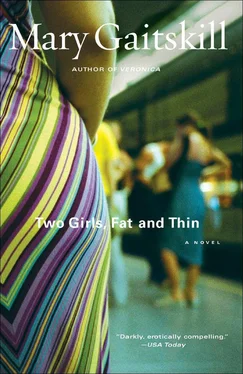Mary Gaitskill - Two Girls, Fat and Thin
Здесь есть возможность читать онлайн «Mary Gaitskill - Two Girls, Fat and Thin» весь текст электронной книги совершенно бесплатно (целиком полную версию без сокращений). В некоторых случаях можно слушать аудио, скачать через торрент в формате fb2 и присутствует краткое содержание. Год выпуска: 2012, Издательство: Simon & Schuster, Жанр: Современная проза, на английском языке. Описание произведения, (предисловие) а так же отзывы посетителей доступны на портале библиотеки ЛибКат.
- Название:Two Girls, Fat and Thin
- Автор:
- Издательство:Simon & Schuster
- Жанр:
- Год:2012
- ISBN:нет данных
- Рейтинг книги:5 / 5. Голосов: 1
-
Избранное:Добавить в избранное
- Отзывы:
-
Ваша оценка:
- 100
- 1
- 2
- 3
- 4
- 5
Two Girls, Fat and Thin: краткое содержание, описание и аннотация
Предлагаем к чтению аннотацию, описание, краткое содержание или предисловие (зависит от того, что написал сам автор книги «Two Girls, Fat and Thin»). Если вы не нашли необходимую информацию о книге — напишите в комментариях, мы постараемся отыскать её.
Review) create a haunting and unforgettable journey into the dark side of contemporary life and the deepest recesses of the soul.
Two Girls, Fat and Thin — читать онлайн бесплатно полную книгу (весь текст) целиком
Ниже представлен текст книги, разбитый по страницам. Система сохранения места последней прочитанной страницы, позволяет с удобством читать онлайн бесплатно книгу «Two Girls, Fat and Thin», без необходимости каждый раз заново искать на чём Вы остановились. Поставьте закладку, и сможете в любой момент перейти на страницу, на которой закончили чтение.
Интервал:
Закладка:
I was frightened and fascinated by the boy. It terrified me to think that you could be standing on a porch, my porch, receiving official candy in a spirit of goodwill and then, with one wrong movement, be pitched into darkness, cracking your head in a way that could kill you. I stared at his eyes. They were a garish painted mask of red and blue, his sole costume. His lashes were long and beautiful, his eyes serene and wide, completely undisturbed by the large red gash in his head. I stared at the gash and at the brown hairs mashed around in the blood. I thought I was looking right into his brain. It seemed glowing and wonderfully mysterious. I felt very close to him. I wanted to put my hand in his head. We could get into trouble for this.
He started to whimper and tremble and to suck violently on his thumb. My mother got off the phone and came to him. “Poor little one,” she said. “Soon everything will be all right.” She put her arm around him, and suddenly I wanted to do the same, to protect and heal the boy.
I ran out of the kitchen and got my stuffed animal, a little limp dog named “Greenie.” I thrust it at the boy and said, “Take Greenie.” He did. He held Greenie tightly with one arm, sucking his thumb, quiet again, his beautiful eyes looking at me with what seemed like curiosity. I stared into his deep red brain until my mother bundled him in her sweater and took him to the hospital.
I let him take my toy. I felt that Greenie had helped him in some way, and it made me feel good to think that I could help a person, especially a person whose brain I’d seen. When I got Greenie back the following week, I valued him all the more as a healer and personal emissary of my goodwill.
When it was over, my father held me on his lap. He held me as though he was frightened of what had happened to the boy and thought I must be frightened too. The house was dark, the radio was singing to us in the background. His hands encircled the ankle of one of my legs and the knee of the other, and I rested in his body as though it were infinite. He said, “The Daddy will never let anyone hurt his little girl.” He said it as though the sentence itself was grand, as though saying it turned him into a stone lion, immobile but internally watchful and fierce.
Once my father took me with him to watch a basketball game. These were the games he talked about when he walked around the house, rubbing his fingers together and saying “the Mighty Reds” or “Hey hey! What do you say? Get that ball the other way!” as though the words were inflatable cushions of safety and familiarity with which he could pad himself. The Reds were clearly one of the good forces in life, playing basketball against bastards and viciousness. Even my mother said their name in the way people talk about doing right; it wasn’t fun, but you had to admit it was important.
The game wasn’t fun either. The auditorium was hot and muggy, full of muffled senseless noise and strangers with invulnerable gum-chewing faces. Sweating men ran with meaningless urgency, straining to prevent each other from doing something that changed from moment to moment. Strangers sat on benches roaring at intervals. My father sat with his neck stretched forward, his face set in the expectant, placated look he had when the world was forming a pattern he approved of.
When it was over we walked home in the dark. “The old Reds won,” said my father. “Don’t you want to cheer?” I cheered into the damp night as I ran up the sidewalk. The houses and trees were remote and strange in the dark, the mailboxes lonely and disoriented on their corners. Cars swished by in mournful sweeps of light, and we walked in triumph.
At home there was cinnamon toast and hot chocolate and my mother in her special white Chinese robe with black dragons on it. We marched into the rec room, Daddy carrying me on his shoulders, my legs dangling down his chest. Fat old Walnut the cat thumped behind us, his tail low and steady. My father put Carmen on the record player, and I darted around the room, swirling in an invisible lavender skirt. Daddy and Mother kissed on the blue-flowered sofa. Mother’s legs were folded and tucked against her body like the wings of a plump bird, and I saw the jagged shred of toenail and the hard little callus on her pink incurved baby toe. Her husband’s hands covered her face as he kissed her. “Olé, olé!” shouted prancing me. Scornful Carmen, with an aquiline nose and a rose in her teeth, silently leered from the velvety dark of her album cover where she sat propped sideways against a tall blue lamp. She had been stabbed to death by the time Daddy swung me into his arms. “Up the magic mountain, one, two, three. Up the magic mountain, yessiree.” We left Walnut curled beside the heat vent. Mother followed behind, smiling at my head as it rested on Daddy’s shoulder, hitting light switches as we passed from room to hall to room to staircase. “She’s going to sleep with Mama and Daddy tonight because the Reds won and because she is such a good girl.”
My memory of that night is a swollen, rose-colored blur that shades every thought venturing near it. The pink bed was massive. The quilts and blankets were rumpled into low mountain ranges with frowning indentation eyes and brows that stretched and melted when Daddy pulled the blankets over me. Tiny curls of hair and granules were the worms and earth of the pink bed world. The smell of Daddy’s hair oil and Mama’s perfume penetrated me like a drug too strong for my system to metabolize.
I lay cuddled in the arms of my softly pajamaed father, waiting for Mama, who was lazily brushing her hair at the vanity table. The rest of the room with its furniture, curtains, glimmering bottles, and snakes of Mama’s jewelry was a dream of objects that claimed to be familiar but weren’t. Then the light went off, and Mama slid between the sheets, her fragrant body heat lilting from the open space between nightgown and skin, and there was no longer any world outside the bed. When my eyes adjusted to see the gray squares of window and the trees beyond, they were faraway as stars, and the lumbering furniture was ephemeral as the half-dreams that bother you when you’re trying to wake up.
Chapter Five
Justine Shade had unusually attractive parents, something she came to hold against them for reasons unknown to her. Even when she was five, she says, she knew that they were socially beautiful, although that concept is foreign to five-year-olds. They weren’t exquisite or perfect, but they had a reassuring, bigboned blondness (her mother), an elegant, slouching, Cary Grantesque authority (dad) that people responded to as though a cerebral complacency-center was stimulated by the mere sight of them.
When Justine thought of her childhood with them, she thought of the shoeboxes of color photos stored in a living room closet in their Deere Parke, Michigan, home. As an adult, Justine used these photographs as a set of icons, talismans against her fear that there had been something unusually nasty about her childhood. She would take the photographs out of their shoeboxes and vinyl albums and arrange them in bouquets that spanned the floor before her as she hunched near the radiator, holding her white-socked feet for warmth as she brooded over these proofs of family happiness and genetic beauty. There they were, eager, rosy, smiling young parents, kneeling to hold their tiny daughter upright between them as she stood on her unsteady legs like a worried poodle, her face quizzical, solemn, and concentrated. At age four, she was caught in a wild charge across the living room in her white gown, her cheeks pink, her eyes glittering with a flashbulb-induced diamond pupil. She smiled on a swing set. She squatted shyly in a sandbox, squeezing the ruffles of her red swimsuit; she stood with her slender legs in bathing beauty position, one hand on her hip, her face demurely composed as an uncouth neighborhood child holding a garden hose gaped. At nine she dolorously examined the contents of an Easter basket; beyond a piece of cockeyed floor, tilted by her mother’s weird camera angle, her pajamaed father sat on the edge of a couch, holding a green coffee cup with both hands and looking bitterly into space, his glasses on the end of his nose. She stood in the doorway, a princess in gauze and yellow spangles, a delicate rhinestone tiara, and cheap sandals spray-painted gold, holding her Halloween bag and smiling as her mother captured her creation on film.
Читать дальшеИнтервал:
Закладка:
Похожие книги на «Two Girls, Fat and Thin»
Представляем Вашему вниманию похожие книги на «Two Girls, Fat and Thin» списком для выбора. Мы отобрали схожую по названию и смыслу литературу в надежде предоставить читателям больше вариантов отыскать новые, интересные, ещё непрочитанные произведения.
Обсуждение, отзывы о книге «Two Girls, Fat and Thin» и просто собственные мнения читателей. Оставьте ваши комментарии, напишите, что Вы думаете о произведении, его смысле или главных героях. Укажите что конкретно понравилось, а что нет, и почему Вы так считаете.












